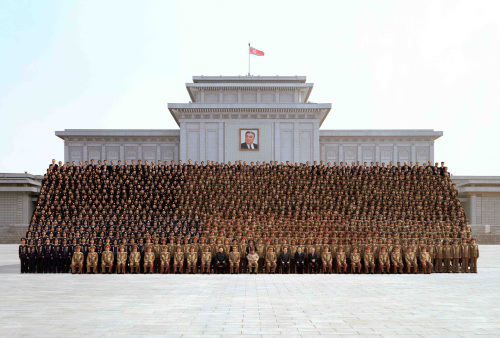North Korea opened its parliament Thursday as speculation ran high over whether its ailing leader Kim Jong-il would name his youngest son to a post that would officially make him the reclusive state’s second most powerful person.
Heir apparent Kim Jong-un was largely expected by outside observers to be further promoted to Pyongyang’s National Defense Commission during the meeting, a move that will cement the 20-something’s status as the communist regime’s next leader.
The incumbent Kim, 69, currently heads the commission as the vice chairman position remains vacant since the death of Jo Myong-rok, Kim’s longstanding aide.
Being elected to the second-highest position in the commission would give Kim Jong-un the authority to make inspection trips to factories, farms and army units without the assistance of his father, a key sign of power in the communist state.
A little over six months ago, the younger Kim, who is believed to be no more older than 28, was made a four-star general and appointed as a vice-chairman of the Workers’ Party Central Military Commission, which oversees the 1.2 million-strong armed forces.
A day ahead of the Supreme People’s Assembly meeting, the North’s official Korea Central News Agency reported that delegates across the country have arrived in the capital Pyongyang, laying bouquets under a statue of their Dear Leader’s mother Kim Jong-suk.
 |
This undated photo shows North Korean leader Kim Jong-il (center, front row) attending a photo session with a group of elite soldiers in front of the Kumsusan Memorial Palace in Pyongyang. (KCNA-Yonhap news) |
The communist state’s parliament usually convenes twice a year to pass rubber stamp bills such as budgets and personnel matters submitted by its ruling Workers’ Party. It was the first time for the parliament to open since the third son Kim Jong-un was unveiled to the outside world as the incoming dictator last year.
Having suffered a stroke in 2008 and apparently still struggling with health issues, incumbent Kim Jong-il is making haste in having his youngest son approved by the military and the people as his successor, a process that may be completed as early as next year, analysts say.
North Korea says it will to be internationally recognized as a nuclear power and become a so-called “powerful and prosperous nation” by 2012, which marks the 100th anniversary of the birth of Kim Il-sung, its founder and the late father of the incumbent dictator.
While North Koreans, who are kept isolated from outside news, approve of the three-generation succession on the surface, many secretly question the capabilities of the young heir apparent, those who have observed Pyongyang for years say.
As one way of defusing such internal tensions and instability, North Korea has been increasing efforts to secure outside assistance by mending ties with Seoul as well as other regional powers.
Upon an extensive survey, the World Food Program announced last month that more than 6 million of North Korea’s 24 million people are in need of outside food aid.
Facing criticisms that shipments of civilian humanitarian aid should at least be allowed, the South Korean government approved the first civilian aid in months last week.
South Korea and the U.S., however, continue to suspect Pyongyang is secretly stockpiling food in its military warehouses to prepare for potential war as well as special handouts meeting the 100th anniversary of its founder in 2012 April.
Aid to North Korea had been steadily decreasing since the right wing Lee Myung-bak government took power in 2008 and came to a complete halt in November when North Korea bombarded a border island, killing four South Koreans.
North Korea has not yet admitted, let alone apologized, for the two deadly attacks it made against the South last year, turning Seoul reluctant to reopen the regular inter-Korean dialogue channel.
Pyongyang is in need to first mend ties with Seoul to rejoin the stalled aid-for-denuclearization talks with other dialogue partners. The six-nation talks, also involving the U.S., China, Japan and Russia, have been suspended since the end of 2008.
By Shin Hae-in (
hayney@heraldcorp.com)








![[Today’s K-pop] Blackpink’s Jennie, Lisa invited to Coachella as solo acts](http://res.heraldm.com/phpwas/restmb_idxmake.php?idx=644&simg=/content/image/2024/11/21/20241121050099_0.jpg)